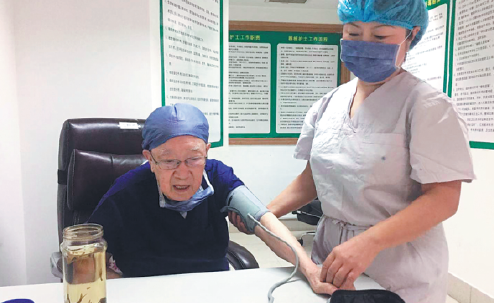Rock-steady Wu helps cancer patients cross troubled waters
By Lin Shujuan in Shanghai | China Daily | Updated: 2018-11-26 09:11

One in two of the world's liver cancer patients live in China, he said. A leading cause of the condition is hepatitis B, which is endemic in the country and other parts of Asia. An estimated 200 million Chinese have liver diseases, including hepatitis B.
Though almost 60 percent of Wu's patients lived for at least five years after surgery, China in general lags behind most developed countries in its overall five-year survival rate for liver cancer patients.
"We still have a long way to go to improve our liver surgery techniques," he said.
In 2005, Wu was honored with the State Pre-eminent Science and Technology Award, China's highest award in science. Wu donated his 5 million yuan ($770,000) award to assist his students' research.
Born in Fujian province, Wu followed his parents to Malaysia at the age of 5 for a better life. Despite his family's poverty, his parents insisted he had a decent education. Hence, Wu spent his next 13 years in Malaysia mostly tapping rubber trees in the morning and attending school in the afternoon.
By the time he returned to China to support the fight against Japanese invaders in 1940, he had become so experienced in tapping that he could even perform stunts with a tapping knife, which he joked served as great practice for his career as a surgeon.
"I've always been interested in handiwork," said Wu, explaining why he chose to become a surgeon, although at medical college his lack of height was considered a possible stumbling block.
Standing at 1.62 meters tall, Wu often has to stand on a stool during surgery. But once he stands there, a sense of calm descends in the operating room.
"It's always stunning to see how energetic he is at his age, especially when he's in the operating room," said Cheng Yue'e, a 55-year-old nurse who has worked with Wu for more than 30 years.
"His operations are quick and accurate."
Professor Yan Yiqun, director of the No 1 hepatic department at Wu's hospital, attributed the high five-year survival rate for Wu's patients to the surgeon's unique methods, which reduce the surgical time and help patients recover faster.
"Most of the surgical techniques I use come from Wu's methods," he said.
Wu said one thing he keeps reminding his students is that they have to put their patients' health first.
"Lay down like a bridge to carry them over troubled water," Wu said, citing the motto he learned from his late mentor, Qiu Fazu, who was known as "the father of modern Chinese surgery".
Wu's colleagues and patients said on cold days he will warm his hands in his pockets before checking a patient.
"Most of my patients have hepatitis, which scares others away. But as a doctor, I must respect and love my patients," he said.
Since his wife died six years ago, Wu has led a simple life working at the hospital, according to Cheng.
"His meals are basically light and simple, and he doesn't eat much," she said.
"He usually has a cup of milk and an egg for breakfast, and noodles for supper. He has little for lunch.
"Continuing to work is exercise for him, mind and body. The sight of him still working regularly in the hospital is an encouragement for all of us. No one feels old."
Yet Wu said he cannot defy nature.
"Of course, I feel tired. But I'll keep working as long as I have the energy," he said.
The biggest comfort, he added, was "seeing so many of his students growing into leading experts in the medical field, and the establishment and expansion of the hospital, which is essential to the fight against liver cancer".
Wu's hospital opened a branch in Shanghai's suburban Jiading district in 2015. This allows the hospital - the most sought-after by liver and gall bladder patients nationwide - to undertake more than 100 surgeries a day.
"My efforts alone are not enough to help Chinese people get rid of the disease," Wu said. "I wish to train more successors to improve our operating techniques in the remaining years of my life."
























